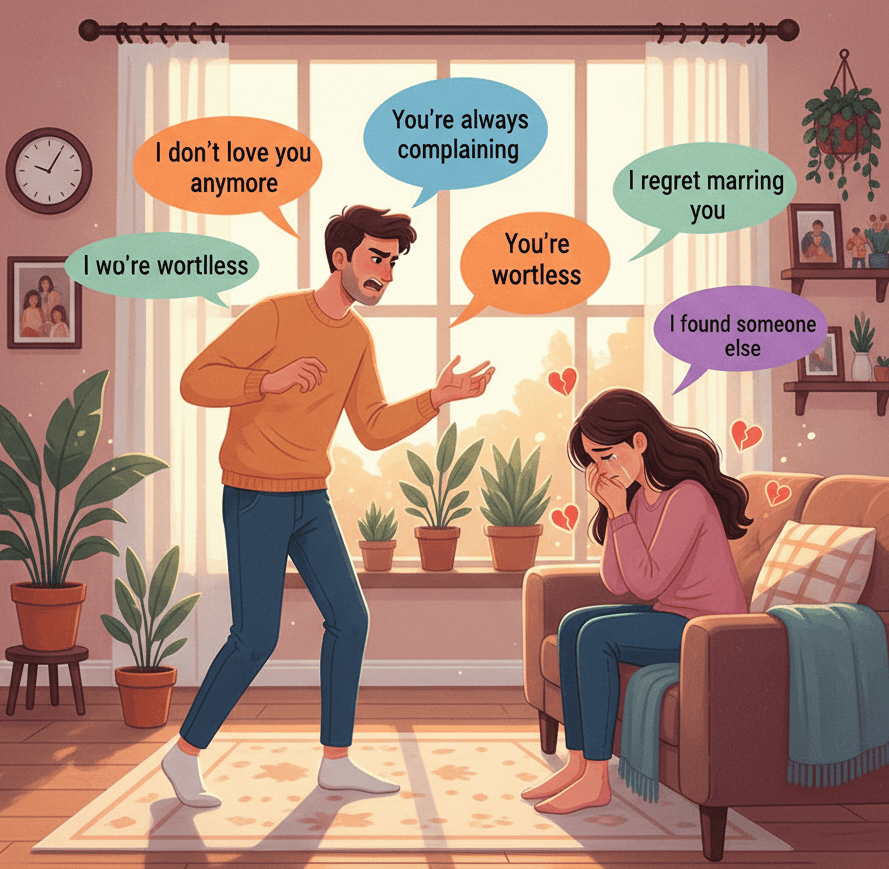Where Every Connection Becomes a Bond

You used to be beautiful to him. He used to light up when you entered a room. He used to want to understand you, to know you, to build a life with you.
But something changed. And now, the words coming out of his mouth feel like daggers.
Hate is a strong word. But when a man hates his wife, it shows up in language—in what he says, how he says it, and the narratives he’s constructed about you.
The scariest part? Sometimes hate doesn’t scream. Sometimes it whispers. Sometimes it hides behind logic and “concern.” Sometimes it masquerades as jokes or “just being honest.”
Understanding the language of hatred in a marriage isn’t about diagnosing your relationship or making you paranoid. It’s about recognizing patterns that signal you may be in danger—emotionally, psychologically, or physically.
Let’s explore the seven most common things a man says when he hates his wife.
1. “You’re the Problem—Everything Would Be Better If You Were Different”
He never takes responsibility. Everything is your fault.
You’re not ambitious enough. You’re not attractive enough. You’re not a good enough mother. You’re too emotional. You’re not feminine enough. You’re too independent. No matter what you do, it’s never right, and it’s always your fault.
When you bring up his behavior, he pivots: “If you were more loving, I wouldn’t have to stay late. If you were more attractive, I wouldn’t have wandered. If you were more submissive, we wouldn’t fight.”
What he’s doing: He’s refusing accountability while simultaneously blaming you for his choices.
This is a classic pattern of misogynistic thinking—the belief that his wife is responsible for his feelings, his actions, and his happiness.
2. “I Can’t Stand Being Around You”
The words might not be exactly those, but the message comes through clearly:
“I’d rather be anywhere else than home.” “You exhaust me.” “I can’t even have a normal conversation with you without it becoming difficult.” “You drive me crazy.”
What makes this particularly damaging is that he says it with exasperation, like your mere presence is a burden. Like your existence is an inconvenience.
This creates a dynamic where you start walking on eggshells, trying to be smaller, quieter, less present—anything to reduce the burden of your existence.
3. “You’re Crazy / You’re Overreacting / You’re Being Too Sensitive”
This is gaslighting dressed up as concern.
You express a legitimate concern, and instead of listening, he dismisses you. Your feelings aren’t valid. Your perspective is wrong. You’re the crazy one for having emotions.
Over time, this makes you question your own sanity. You start believing that your perceptions are faulty. That your emotions aren’t justified. That something is wrong with you, not with what he’s saying or doing.
This is one of the most psychologically damaging patterns because it undermines your ability to trust yourself.
4. “If You Were More Like [Other Woman], Everything Would Be Fine”
He compares you to his coworker. To his ex. To his friend’s wife. To a celebrity. Anyone but you.
And suddenly, you’re competing with phantom versions of women that he’s constructed in his mind.
These comparisons aren’t innocent. They’re a form of psychological abuse designed to make you feel inadequate. They communicate that you’re less-than. That you’re not enough.
5. “I Don’t Trust You / You’re Too Friendly With [Other Man]”
He becomes possessive. Jealous. Controlling about your friendships, your work relationships, your time with family.
He accuses you of flirting, of being disloyal, of having inappropriate relationships—often without evidence. His jealousy is actually a mirror of his own infidelity or his belief that women are inherently untrustworthy.
But the consequence is that you become isolated. You cut off friendships to ease his insecurity. You reduce contact with your family to keep him calm. You become increasingly dependent on him—which is exactly what he wants.
6. “Nobody Would Want to Be With You / I’m Staying for the Kids”
These statements communicate the same message: I don’t want to be with you. I’m here against my will.
This devastates a woman’s sense of self-worth. It communicates that she’s unlovable. That she’s only valuable as a caretaker for the children. That her husband is making a sacrifice by staying.
7. “You Deserve This / This Is Your Fault” (During or After Abusive Behavior)
If he’s emotionally, verbally, or physically abusive, he often justifies it by saying you caused it. You made him angry. You provoked him. You deserved it.
This is blame-shifting at its most dangerous.
He transforms himself from the perpetrator into the victim—the one who had no choice but to respond this way because you made him do it.
What These Statements Have in Common
They all communicate contempt. And according to relationship expert John Gottman, contempt is the most corrosive force in a relationship.
Contempt says: “You are beneath me. You are not worthy of my respect. You are the problem.”
Contempt is different from anger or disappointment. Anger can be addressed. Disappointment can be resolved. But contempt—the belief that your partner is fundamentally defective—is almost impossible to overcome.
If You’re Hearing These Statements
First, understand that his hatred is not about your worth.
You could be the most beautiful, most accomplished, most loving person in the world, and a man who hates women will still find reasons to devalue you. Because the issue isn’t you—the issue is his belief system.
Second, recognize that these patterns often escalate.
Verbal abuse can progress to emotional abuse, which can progress to physical abuse. If you’re hearing these statements, you’re already in an emotionally abusive dynamic. And emotional abuse is dangerous.
Third, understand that you cannot fix this.
You cannot love him into respecting you. You cannot change yourself enough to make him stop hating you. You cannot compromise your way into his acceptance.
The only person who can change this dynamic is him—through genuine introspection, accountability, and therapy.
What You Need to Do
If you’re in a relationship with a man who’s displaying these patterns, your priority needs to be your own safety and mental health.
Reach out to people you trust. Contact a domestic violence hotline. Speak with a therapist who understands emotional and verbal abuse. Make a plan.
You deserve to be in a relationship where you’re valued, respected, and believed.
Staying in a marriage with someone who hates you—or hates women—won’t teach him to love you. It will teach him that his contempt is acceptable.
And staying will slowly destroy you.
Your life has value. Your presence matters. You are not the problem, even if he’s spent years convincing you that you are.




